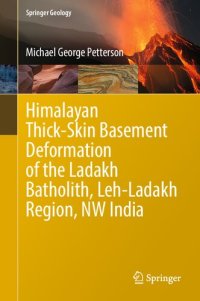
Ebook: Himalayan Thick-Skin Basement Deformation of the Ladakh Batholith, Leh-Ladakh Region, NW India
Author: Michael George Petterson
- Genre: Geology
- Series: Springer Geology
- Year: 2023
- Publisher: Springer
- City: Cham
- Language: English
- pdf
This book presents the first report and interpretation of the deformation, structural style, and geo-tectonic evolution of a 600km2 area of the Ladakh batholith, NW India, centred on the city of Leh, Ladakh. The Ladakh (and westerly Kohistan ) batholith comprises a large component of the Jurassic-Oligocene Kohistan-Ladakh Arc-Terrane (KLA), with magmatism spanning island arc, continental margin, and post-Himalayan collision tectonic environments. The KLA is bounded to the north by the Shyok-Northern Suture and to the south by the Indus Suture. The batholith illustrates basement thick-skin tectonic deformation and is divided/partitioned into a series of crustal blocks separated by lateral accommodation structures which allow independent movement in horizontal and vertical space. Thin skinned deformation within the adjacent sedimentary molasse Indus Suture Rocks produced large thrust stacks that predominantly moved towards the N-NE. Whilst deformation within cover sequences influences the basement structures, and helps break up the basement into crustal blocks, there is a clear distinction in deformation between the basement and cover sequences. Basement batholith deformation is more complex and heterogeneous, reflecting the variable transmission of tectonic stress within crystalline crust and the presence of a wide range of precursory inherited weaknesses and anisotropies. Models of time-space deformation are presented using data derived from field and extensive photograph / photo-mosaic image interpretation. The batholith was deformed during at least Palaeocene-Pliocene times at crustal depths that correspond to the ductile-brittle transition zone and shallower.